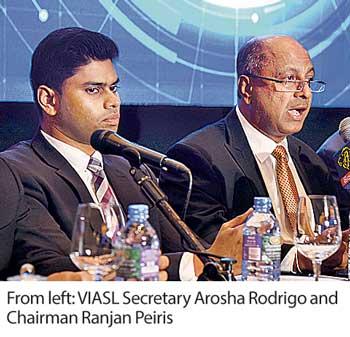08 Mar 2019 - {{hitsCtrl.values.hits}}
 By Nishel Fernando
By Nishel Fernando
The proposed luxury tax on vehicles will hinder the government’s ambitious target of collecting Rs.48 billion in revenue from duties, as the proposed tax would lead to drastic decline in vehicle imports to the country, the Vehicle Importers Association of Sri Lanka (VIASL) claimed yesterday.
“The government is expecting the previous number of vehicle imports to be carried on even with the luxury tax. However, it won’t probably happen. The government has to look at realistic numbers when they impose a tax. With the proposed tax structure, people won’t import vehicles,” VIASL Secretary Arosha Rodrigo said.
The government imposed a luxury tax on motor vehicles on the Cost, Insurance and Freight (CIF) value of the vehicle or the manufacturer’s price in excess of the luxury tax-free threshold determined by the government, based on the type of vehicle.
Accordingly, the government imposed a luxury tax-free threshold for diesel and petrol vehicles at Rs 3.5 million to be subjected to 120 percent and 100 percent luxury tax respectively.
The government also imposed 60 percent luxury tax on electric vehicles, which have a tax-free threshold of Rs.6 million.
Addressing a press conference yesterday in Colombo, VIASL Chairman Ranjan Peiris noted that the industry was taken by surprise by the announcement of a luxury tax on imported vehicles.
He pointed out that luxury tax coupled with increased import duties would create an unprecedented increase in vehicle prices affecting industry players as well as Sri Lanka’s middle class in particular.
VIASL noted that certain motorcars with 1000 cc engine capacity would be subjected to an additional Rs 1.2 million taxes due to the proposed tax structure making such vehicles unaffordable for Sri Lanka’s middle class.
“Even for an electric car, you have to look at a luxury tax of Rs.2.0 million,” Rodrigo said.
VIASL proposed that the luxury tax should be calculated according to the engine capacity and the threshold should be at least increased to Rs.6.0 million.
VIASL membership expects to meet Finance Ministry officials shortly to discuss the matter.
In addition to the luxury tax, the government proposed to increase the excise duties on passenger motor vehicles—from small cars, with less than 1,000 cc (cubic centimeters) engine capacity, to vehicles with larger engines up to 2,000cc.
Accordingly, a petrol vehicle with the engine capacity of less than 1,000cc will now be subjected to a tax of Rs.2, 000 per cubic centimeter and vehicles with the engine capacity of 2,000cc will have a duty of Rs.6, 350 per cubic centimeter.
Hence, a smaller car with the engine capacity of 800cc will have a total duty payable of Rs.1.6 million.
However, Budget 2019 also proposed to remove the 200 percent cash margin requirement imposed on vehicle imports encouraging more vehicles to flow into the country by easing credit restrictions.
VIASL appealed to authorities to increase the current loan-to-value ratio to 75 percent from current 50 percent, which is required when prospective buyers make a vehicle purchase.
Meanwhile, VIASL noted that though the production tax on mini “buddy” trucks, with a cargo capacity of less than 2000 kilos, was reduced by Rs 100,000 in Budget 2019, this reduction will be insufficient to create any significant impact and encourage more buyers due to current prices and the exchange rate.
According to VIASL, its membership accounts for over 60 percent of vehicle imports to the country.
15 Nov 2024 3 hours ago
15 Nov 2024 4 hours ago
15 Nov 2024 5 hours ago
15 Nov 2024 5 hours ago
15 Nov 2024 5 hours ago